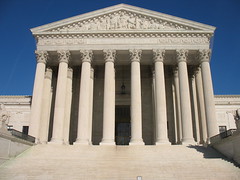 After more than a year of court cases, the healthcare law has finally arrived at the Supreme Court. It is expected that the Supreme Court judges will announce whether or not they will hear this case perhaps as early as Monday, November 14, 2011. If so, we could have the final answer about whether or not the insurance mandate is constitutional.
After more than a year of court cases, the healthcare law has finally arrived at the Supreme Court. It is expected that the Supreme Court judges will announce whether or not they will hear this case perhaps as early as Monday, November 14, 2011. If so, we could have the final answer about whether or not the insurance mandate is constitutional.
It has come a long way, but the trip may soon be over. President Obama signed the Affordable Care Act on March 23, 2011. The most controversial portion of the health reform law involves what has been called the “Insurance Mandate”. According to Heathcare.gov, (which is a government run resource of information about the Affordable Care Act), it is called “Individual Responsibility”.
No matter what you want to call this part of the health reform law, it comes down to the same thing. It requires all Americans to be enrolled in a health insurance plan that meets “basic minimum standards”, in 2014. Those that do not have health insurance at that time must purchase some.
If you choose not to pay for health insurance, you will pay “an assessment”. People who make very low income, who truly cannot afford to buy health insurance coverage, will get some financial assistance to help them afford a health insurance policy.
There has been more than one court case filed by groups who feel that the requirement that all Americans have to buy health insurance in 2014 is unconstitutional. Some of those cases were appealed, and heard by a Court of Appeals. Then, some of those decisions were appealed. This is a very short description of what happens before a case can be heard by the Supreme Court.
So far, the “individual mandate” has been heard by 12 appellate judges. Only three of those judges decided that it was unconstitutional. Nine have decided that it was constitutional. Not one of the appeals courts decided that the law must be tossed out.
Whatever the Supreme Court decides about this controversial law will be the final, ultimate, decision. What remains to be seen is if the Supreme Court will, or will not, hear this case at all. If so, then we will have to wait and see which of the appeals will be the basis for their decision making process. There could be some clues about this given on Monday, November 14, 2011, when the Supreme Court makes its announcements.
Image by Kjetil Ree on Flickr

